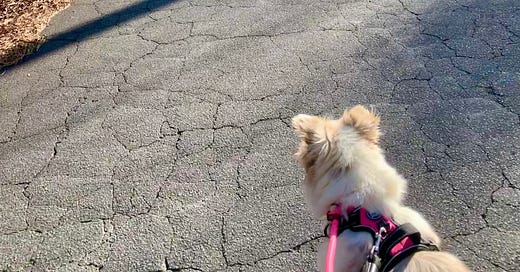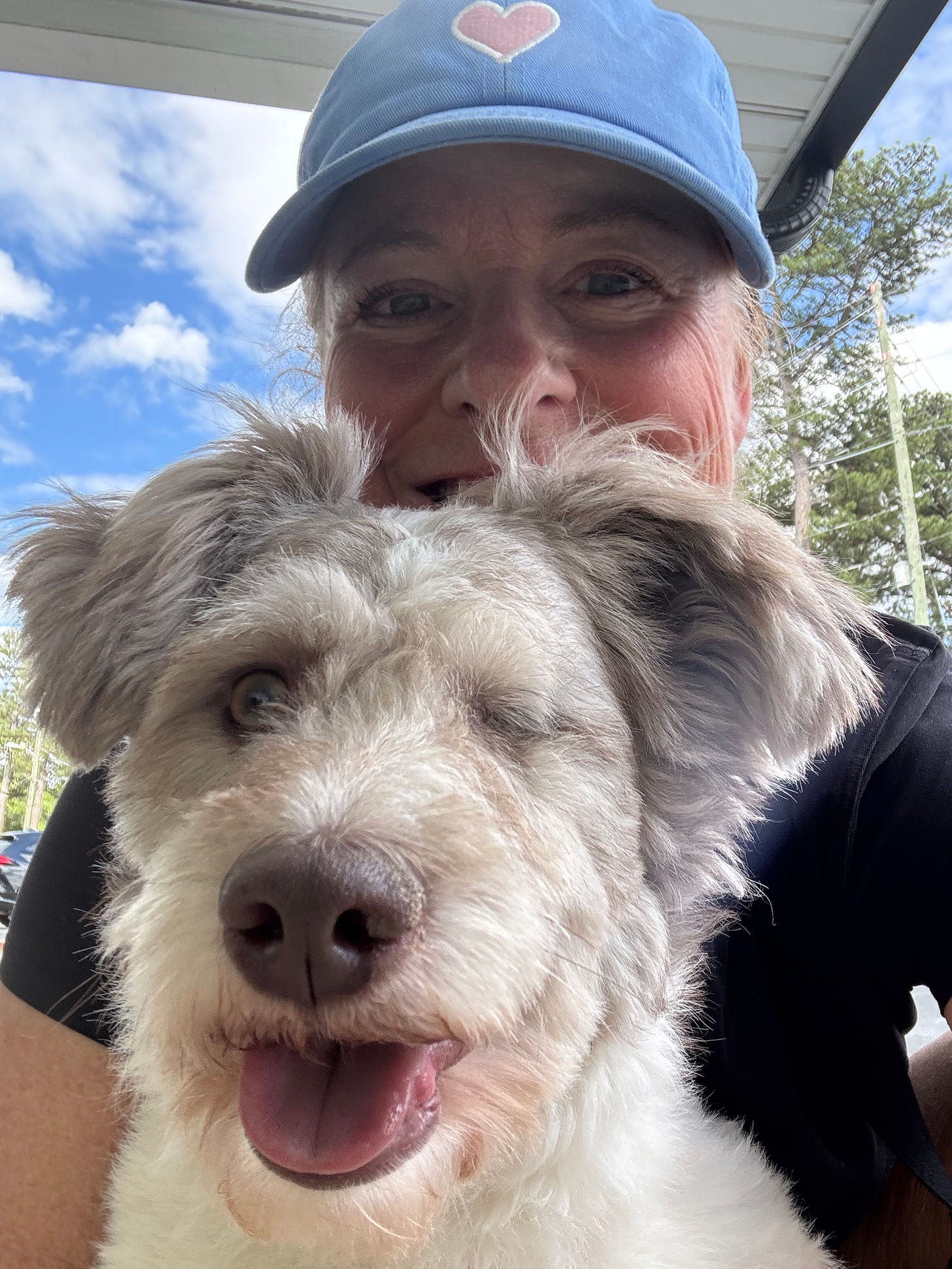Your Quiet Activism Has a Name & It's Needed Now
a true story about putting love into action in a way that feels authentic, sustainable, and shame-free
We sat in a small circle at the animal shelter waiting for the training to begin.
Six women. Different ages. Different backgrounds. Most stared at the floor or fidgeted with their hands.
The silence was growing increasingly awkward.
“I’ve never done this before,” I blurted out, “and my cat doesn’t know I’m here.”
Everyone laughed with relief.
“Is this anyone else’s first time volunteering as a shelter dog walker?” I asked. “Where’s everyone from?”
One by one, they shared. Canada. Mexico. Germany. California. Colorado. Michigan.
The common thread: “I just moved to the area.”
In the journal I brought to take notes, I wrote down their names along with one memorable fact. It felt important to remember.
The following Sunday, as we waited for the dogs to be harnessed up, I greeted each person by name and followed up on something they'd shared in our first conversation.
The relief on their faces was immediate. To be remembered. To be invited into conversation. To not feel invisible.
That matters—at any age.
Suddenly it dawned on me: even as an introvert, I had a knack for helping people feel at home, especially in unfamiliar situations. So, I kept doing it. Week after week. Walk after walk.
Over time, I’ve been entrusted with many deeply personal stories.
A volunteer from India shared that she often feels deeply depressed during the winter because the climate here is so different from home. Walking shelter dogs with her daughter, she said, was a way to help herself get out of the house – and out of despair.
“If I stop coming in the winter, will you reach out?” her voice soft with vulnerability.
The answer was yes.
An older volunteer shared that she began volunteering to cope with the grief of losing her dog. As we walked side by side one quiet Sunday morning, she told me the tragic details of her pup’s accidental death.
“I’ve never told anyone exactly how it happened,” she admitted, guilt heavy in her voice.
I reassured her that it wasn’t her fault.
“Really? Do you really think so?” she asked, so desperately I nearly cried.
The answer was yes.
And then there was the single father who had just moved to be near his daughter. He wasn’t sure about much yet – not the area, not the school system, not what came next.
“Do you mind sharing your experience?” he asked, after I mentioned I was once new to the area with my two daughters.
The answer was yes.
Now, eighteen months into this volunteer role, something has become clear: while it was the dogs that initially drew me in, it's the people who keep me coming back.
I’ve come to see that part of my purpose is to make sure newcomers feel included and to gently welcome those who linger on the edges.
It’s easy to underestimate the value of these small connections; they are quiet, often unnoticed, but I have always suspected they mattered.
So, when I came across the work of Dorcas Cheng-Tozun, I felt a deep sense of recognition. Here was someone putting words – beautiful, validating words – to what I’ve always believed but never fully named.
In her enlightening book Social Justice for the Sensitive Soul, she writes:
“Remarkable things can happen when we take the time to build relationships with one another, especially those who are different from us. When we spend time with others without an agenda, when we listen for the fuller contexts of childhood and culture, when we tap into new reservoirs of empathy, when we nurture genuine affection for another as human before any other label, we have the potential to change and be changed on a soul level.
There’s even a name for the work of connecting to others for the social good: relational activism.”
I had never heard the term relational activism before, but it instantly affirmed how I try to support to the world around me: one interaction at a time.
For much of my life, I’ve carried the belief that if advocacy isn’t loud or public, it must be insufficient or even wrong.
And I’ve felt the weight of that external disappointment deep in my bones.
But as I continue to learn to embrace my most authentic self, I’m discovering how to honor the ways I show up—ways that protect my mental health while still allowing me to make a meaningful impact.
Dorcas Cheng-Tozun speaks directly to this in her book:
“Relational activism is… the kind of activism sensitive, empathic people have the potential to excel at. Healthy dialogue leads to healthy relationships, which promote healthy communities and societies. Sensitive change agents can show the rest of society what it looks like to connect with one another, face-to-face, as fellow human beings, to be for one another even when we are very different from one another.
As the relational activists among us engage and learn and care, they can help us create communities that are far more willing to move boulders, climb mountains, and bridge chasms to ensure dignity and equality for all of us.”
I cried when I read that last sentence.
It gave me comfort—
knowing there is a place in this world for a quieter way of showing up.
It gave me confidence—
confirming person-to-person compassion can be a force for change.
It gave me fuel—
to keep nurturing the small connections that strengthen community.
It gave me hope—
that deep listening and genuine dialogue can dismantle barriers that policies alone can’t reach.
Maybe this sounds familiar to you.
Maybe you’ve never thought of your gift for connection as something world changing.
I hope today, you’ll see it differently.
And more than that, I hope if you’ve been carrying the weight of disappointment, you can finally let go of the idea that your quiet advocacy isn’t enough… because it is.
In these small, but meaningful exchanges, we build the kind of trust that allows us to show up in ways others may not be invited to.
I’ll never forget the text I received from a volunteer after violence erupted in our city. She was from a historically marginalized community and sensed that, on that day, it wasn’t safe to go about life as usual.
“I’m signed up to walk dogs today,” she messaged. “Would you come with me? I’d feel safer.”
The answer was yes.
And it will keep being yes… until the day she feels safe enough to walk freely without fear.
It could be a while, I know; this road to a more just, humane, and safe world is long and uncertain. And one of our greatest challenges will be agreeing on how we get there.
But if love has feet, I think we can actually move forward.
Poet Cleo Wade puts it this way:
“I loved back
Not because
Their love
Sounded sweet
But because
Their love
Had feet.
It did not
Tell you where
It was going
It showed
You.”
Maybe that’s the question we need to ask about our actions, our ideas, our policies:
Does it have feet?
Are we putting love into action in a way that feels authentic and sustainable to us?
Because that’s what moves us forward—
not noise, but presence
not perfection, but consistency
not grand proclamations, but small, heart-centered yeses offered along the way.
Let’s walk the long road together.
My furry companions assure me it’s better than going alone.
My hand in yours,
Rachel
📝 Prompts to Ponder…
🩵What’s one heart-centered “yes” you’ve offered? Did it matter more than you expected?
🩵Where in your life might love need feet right now?
🩵In what ways does your natural temperament shape how you show up for others? How might that be its own form of activism?
🌳 Don’t Miss Our June Treehouse Gathering on Zoom!
Topic: How to Make Mind-Body Aligned Decisions
When I signed up to volunteer as a dog walker, it wasn’t a spontaneous move—or a universally supported one. In fact, some protectors in my life questioned the choice. But I listened to something deeper. And it turned out to be one of the best decisions I’ve made in years.
That experience gave me the clarity and courage to turn down a recent opportunity that, on paper, looked like a smart career move. But my body said otherwise.
In our next Treehouse Gathering, on June 28 at 10am Eastern, I’ll be sharing what I’ve been learning through somatic therapy about how to make aligned choices—especially when the head and heart don’t immediately agree.
We'll talk through:
🌿 A simple tool I return to when I'm stuck
🌿 A breakthrough moment I had recently in session
🌿 A brilliant nonfiction book I can’t stop thinking about that explores one decision through three vastly different outcomes
These Zoom conversations are intentionally small, grounded in care, and open to paid subscribers so attendees (including myself) feel safe to share honestly and authentically.
🔗 Zoom link below. Can’t make it live? No problem. Paid subscribers will receive the replay in their inbox along with key powerpoint slides and journaling prompts from my teaching.
Keep reading with a 7-day free trial
Subscribe to Rachel's Treehouse to keep reading this post and get 7 days of free access to the full post archives.






